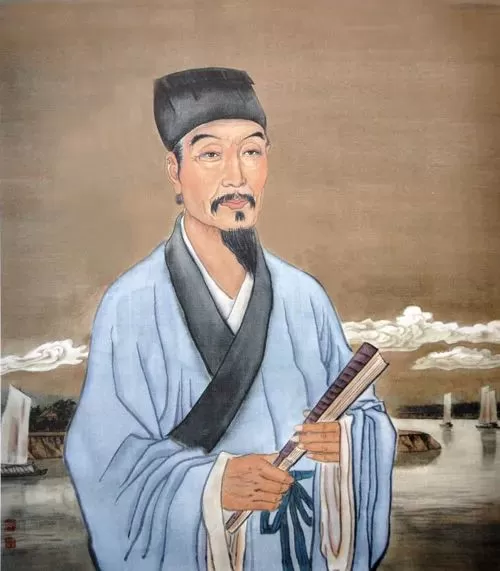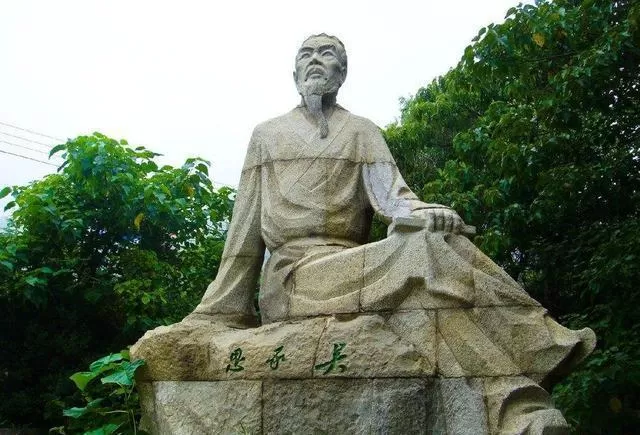
| Chinese name | Wu Chengen |
| Nickname | Sheyang layman, Sheyang mountain people |
| Gender | male |
| Dynasty | The Ming Dynasty |
| Birthplace | Shanyang County, Huai'an Prefecture |
| Date of Birth: | 1500 |
| Date of Death | 1582 |
| Age | 82 |
| Works of Wu Cheng'en | Journey to the West and Mr. Sheyang's Manuscripts |
Wu Cheng'en (circa 1504-1582), styled Ruzhong and also known as Sheyang Hermit or Sheyang Mountain Dweller, hailed from Lianshui (present-day Lianshui County, Jiangsu Province) and later settled in Shanyang (present-day Huaian City, Jiangsu Province). He was a writer and official during the Ming Dynasty in China.
Wu Cheng'en gained fame for his outstanding literary talent in his teens. In the eighth year of the Jiajing reign (1529), he studied at the Longxi Academy and became a "participant in Buddhist banquets." Despite his remarkable talent, he repeatedly failed the imperial examinations. Around the 21st year of the Jiajing reign (1542), Wu completed the first draft of his novel "Journey to the West." He continued to pursue the path of the imperial examinations but encountered many obstacles in his official career. It wasn't until the 29th year of the Jiajing reign (1550) that he was finally admitted as a local tribute student, only to fail the subsequent exams and enroll at the Imperial College. In the second year of the Longqing reign (1568), he was vindicated and summoned to Hubei, where he served as the recorder in the mansion of Prince Jing, Zhu Yiju. In the fourth year of the Longqing reign (1570), he resigned from his post and returned to his hometown. He passed away around the tenth year of the Wanli reign (1582), leaving no descendants.
"Journey to the West," created by Wu Cheng'en, is China's first full-length novel of gods and demons and is listed among the Four Great Classical Novels of Chinese literature. After its publication, "Journey to the West" was translated into over a dozen languages including English, Russian, Japanese, French, German, and Italian, garnering praise worldwide. In his later years, Wu Cheng'en amused himself by composing poetry and painting. He also compiled "A New Collection of Flowers and Plants" and authored the supernatural fiction "The Record of Yu's Tripod," although the original manuscript is lost. His poems and essays were later collected into "The Surviving Works of Mr. Sheyang" in 4 volumes and "Supplementary Works" in 1 volume.

Wu Cheng'en's ancestral home was Andong (now Lianshui County, Jiangsu Province). His ancestors moved to the Huai An River in the late Yuan and early Ming dynasties, and Wu Cheng'en had lived for five generations. My father was a businessman who greatly hoped that his son could achieve fame and fortune. He named him Cheng'en, with the courtesy name Ruzhong, hoping that he could study and become an official, inherit the imperial favor, benefit the people, and be a loyal minister who would leave a lasting impression on history. Wu Cheng'en has been diligent and eager to learn since childhood, and has been able to recite it fluently. Proficient in painting, calligraphy, lyric writing, and Go, I enjoy reading books on immortals, ghosts, foxes, demons, and monkey spirits, such as novels or unofficial histories like "Records of the Hundred Eccentrics" and "Yuyang Zazu". At that time, the celebrity Zhu Yingdeng was proud of his talents and admired Wu Cheng'en greatly. He said that Wu Cheng'en could read all the books in the world and gave him half of his personal collection of books.
In the sixth year of the Jiajing reign (1527), Wu Cheng'en married the great granddaughter of the Minister of Revenue, Ye Qi. In the eighth year of the Jiajing reign (1529), Wu Cheng'en went to study at Longxi Academy founded by Ge Mu, the governor of Huai'an, and was appreciated by Ge Mu. At that time, Wu Cheng'en had already "filled his chest" with the strange news he was searching for and had plans to create it. In the tenth year of the Jiajing reign (1531), Wu Cheng'en came to the Jiangnan Gongyuan in Nanjing to participate in the township examination, but unfortunately fell short of Sun Shan. In the eleventh year of the Jiajing reign (1532), Wu Cheng'en accompanied his father on a journey with a feeling of disappointment. In the 13th year of the Jiajing reign (1534), Wu Cheng'en came to Nanjing again to take the exam, but once again failed and returned home. In the 16th year of the Jiajing reign (1537), Wu Cheng'en came to Nanjing again to take the exam, but was also defeated. In the 21st year of the Jiajing reign (1542), Wu Cheng'en completed the initial draft of "Journey to the West". In the 28th year of the Jiajing reign (1549), Wu Cheng'en came to Nanjing to study at the Imperial Academy.
In the 29th year of the Jiajing reign (1550), Wu Cheng'en was only able to obtain a year old tribute student in middle age and went to Beijing to wait for the allocation of official positions, but was not selected. In the 34th year of the Jiajing reign (1555), a small group of Japanese pirates penetrated deep into the Ming Dynasty's hinterland and even attacked Nanjing. Wu Cheng'en wanted to join the army and fight against the Japanese, but it did not materialize. In the 35th year of the Jiajing reign (1556), due to the poverty of his mother's hometown, Wu Cheng'en served as the magistrate of Changxing County in Zhejiang Province. He often indulged in drinking with his friend Zhu Yuefan, expressing his interest in poetry and wine. He had connections with the Jiajing top scholar Shen Kun and poet Xu Zhongxing. In the 35th to 36th year of Jiajing (1556-1557), he served as the Supervisor of the County of Xinye County. During his two years in office, Wu Cheng'en conducted in-depth field visits to every corner of Xinye, learned about local customs, familiarized himself with river water conservancy, carried out large-scale construction, avoided harm and benefited the people, and wrote the "Water Conservancy Discussion". In the 37th year of the Jiajing reign (1558), due to false accusations, he returned to his hometown and went into hiding. In the second year of Longqing (1568), Wu Cheng'en was appointed as Ji Shan of the Jingwang Mansion in Qizhou.
In the fourth year of Longqing (1570), Wu Cheng'en returned to his hometown from the Jingwang Mansion in Qizhou (now Qichun County, Hubei Province) and began to focus on writing "Journey to the West". In the first year of the Wanli reign (1573), Wu Cheng'en completed the writing of "Journey to the West" (published in the 20th year of the Wanli reign). In his later years, Wu Cheng'en indulged in extravagant poetry and wine. Around the tenth year of the Wanli reign (1582), he passed away in poverty.
Provides The Most Comprehensive English Versions Of Chinese Classical Novels And Classic Books Online Reading.
Copyright © 2025 Chinese-Novels.com All Rights Reserved
